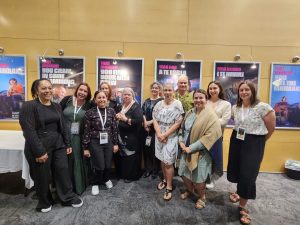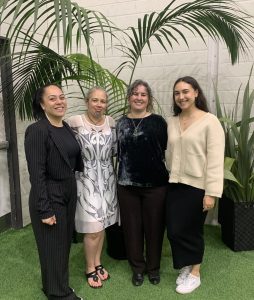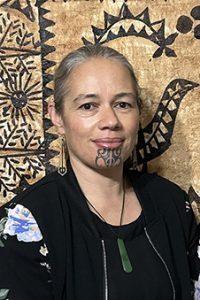MAI hui-ā-tau hosted by Te Kunenga ki Pūrehuroa, Massey University in Palmerston North

MAI ki Otago contingent at MAI hui ā-tau ki Te Kunenga ki Pūrehuroa, Massey University in Pamerston North.
Tokowhā ngā tauira Tohu Kairangi o Te Tumu e haere ana. Te rawe hoki o ngā kōrero me te whakawhanaungatanga i puta ai i reira. Kei runga noa atu te manaakitanga o ngā kaiwhakahaere nō reira, ngā mihi maioha ki a rātou. E rere hoki ana ngā mihi ki Te Kura Rangahau Tāura, ki a Rachel Sizemore kōrua ko Inano Walter i ā kōrua manaaki i a mātou, ko MAI ki Otago.
This year the annual MAI conference was hosted by Te Kunenga ki Pūrehuroa, Massey University in at the Palmerston North campus. Four PhD students from Te Tumu attended the hui. The presentations and networking opportunities were awesome. The hospitality of our hosts was amazing which we all appreciated. We also thank The Graduate Research School especially Rachel Sizemore and Inano Walter for supporting and looking after the MAI ki Otago group.
Highlighting research: Teachers of mainstream curricula, teaching Māori speaking children
Earlier this year Paia Taani, one of Te Tumu’s staff members published an article based on the research undertaken for her master’s degree which investigated teacher preparedness to teach te reo Māori speaking children in mainstream primary schools. Some of her key findings included an awareness of how language and culture impact on identity and educational outcomes. Although participants acknowledged the absolute necessity that te reo Māori and tikanga Māori are included in all aspects of the education setting, they also reported that tikanga Māori is a more comfortable space to be in than te reo Māori as there were clear connections to their own values.
Four key themes emerged from the findings which Paia promotes in the article as key factors for teacher readiness to teach reo Māori speaking children. These are: Kia rite (be prepared), Kia hono (be connected); Kia tātatiako (be culturally competent and responsive) and, Kia whakauruuru (be integrative). This article discusses those four factors listed above and implications for tamariki, their whānau, teachers and ITE providers. You can find the link to her article here, published in the New Zealand Journal of Teachers’ Work, June 2023.
https://ojs.aut.ac.nz/teachers-work/article/view/362
Paia will be presenting on this kaupapa next week, at the New Zealand Association for Research in Education Conference in Palmerston North.
First PhD oral examination held at Ōtākou Marae
E tino poho kererū ana ngā tāngata o Te Tumu ki a Megan Pōtiki. He pūkenga o mua a Megan, ā, ko tētahi o ā mātou tauira tohu kairangi. I tērā wiki, ka tū te whakamātautau o tāna tuhinga kairangi ki tōna marae, i Ōtākou. Koinei te whakamātautau kairangi tuatahi ki tētahi marae o tēnei rohe. Ko “Te Hū o Moho” te ingoa o tāna tuhinga e whakamāramatia nei ngā take i mate ai te reo Māori ki te kāika o Ōtākou i te haurua tuatahi o te rua tekau o ngā rautau. Ko Paerau Warbrick rāua ko Lachy Paterson ngā kaiārahi mō ngā mahi rangahau nei a Megan. I te hui hoki tōna whānau rātou ko ōna hoa. I reira hoki a Jacinta Ruru (ko te kaiwhakarite o te whakamātautau) rātou ko ngā kaiwhakawā tokorua, ko Tony Ballantyne rāua ko Peter Meihana (nō Te Kunenga ki Pūrehuroa). Pai rawa atu te kōrero whakamārama a Megan, me āna whakahoki i ngā pātai a ngā kaiwhakawā. Ka mutu ngā pātai a Tony rāua ko Peter, ka matapakitia āna rangahau e ērā atu tāngata o te hui. He tikanga rerekē tēnei, ā, ka whakaaetia e te katoa he tikanga pai, ā, ka whakamahia pea mō ngā whakamātautau kairangi katoa. Heoi, ka whakatau ngā kaiwhakawā, he rawe te tuhinga a Megan. Kia whakatikatia he hapa pakupaku, ka oti āna mahi. He rongo tino pai tēnei. He nunui hoki ā mātou mihi ki ngā tāngata whenua o Ōtākou mō te pai o te pōwhiri, me te reka hoki o te hākari.

Megan Pōtiki pictured here with her whānau, and kaitautoko from the University of Otago at Ōtākou Marae.
Staff at Te Tumu are extremely proud of Megan Pōtiki. She was a former lecturer, and has been one of our PhD students. Last week, the examination of her doctoral thesis was held at her marae, at Ōtākou. This is the first doctoral examination on a marae of this region. Her thesis is entitled “Te Hū o Moho” in which she explained the causes of the death of the Māori language in her village of Ōtākou in the first half of the twentieth century. Paerau Warbrick and Lachy Paterson were the supervisors of her research work. Her friends and family were also at the hui. There too were Jacinta Ruru (the examination convenor) and two of the examiners, Tony Ballantyne and Peter Meihana (Massey University). Megan gave an excellent presentation, as were her answers to the examiners’ questions. When they had concluded their questions, other people at the hui then discussed her research. This was a departure from normal process, and everyone agreed it was a great tikanga that might be used for all doctoral examinations. The examiners determined that Megan’s thesis was excellent, and when she tidies a few typos, she will be finished. This is great news. We would also like to thank the local people at Ōtākou for their warm welcome, and the wonderful food.



